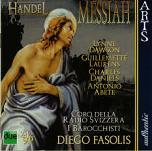This is a thoughtful, small-scaled, pious (rather than dramatic) reading of Messiah. With both chorus and period-instrument orchestra numbering less than 30 each, everything is audible, clear, and cleanly articulated. Happily, Diego Fasolis leads without any eccentricities: no shocking tempos–either too fast or too slow–intrude, and there is a lovely, natural flow to the narrative. The “big” numbers do not seem like showstoppers; indeed, Fasolis’ decision to cut much of “Why do the nations…” might be an attempt to de-emphasize the work’s virtuoso moments. Similarly, embellishments are very sparse throughout. The musicians attack gently at all times, and the chorus, somewhat accented, is up to its job, invariably singing lightly.
Best of the soloists is Lynne Dawson, whose singing is intelligent, precise, and sweet-toned. Guillemette Laurens is effective and moving in the darker mezzo moments, but the voice is a bit worn. Charles Daniels, normally wonderfully show-offy with coloratura, is subdued, even in “Ev’ry valley”, and Antonio Abete is a good enough bass, though undistinguished. I guess the issue is how necessary this will be to your collection: It certainly does not displace the Christie on Harmonia Mundi nor the timeless Mackerras on EMI.
































